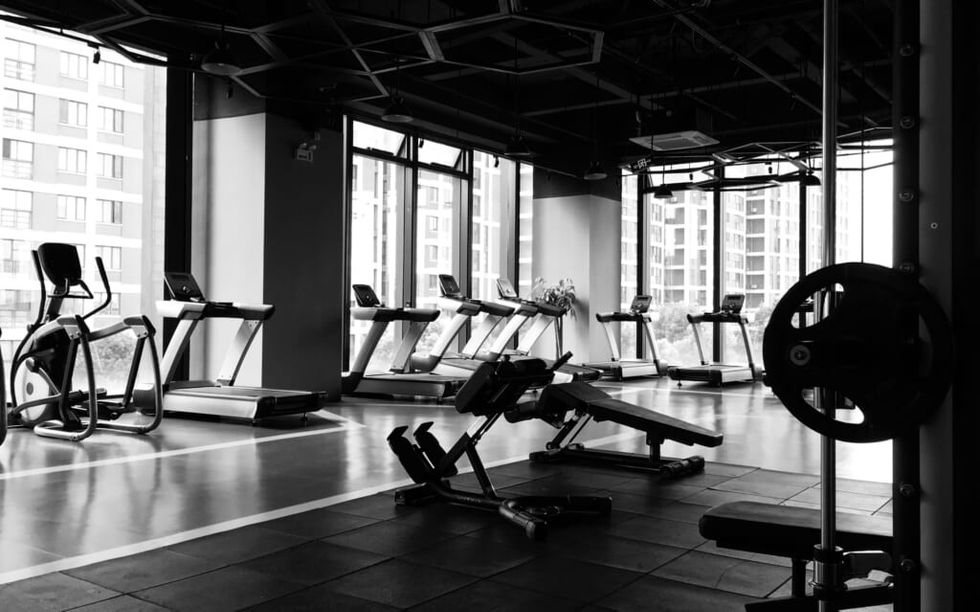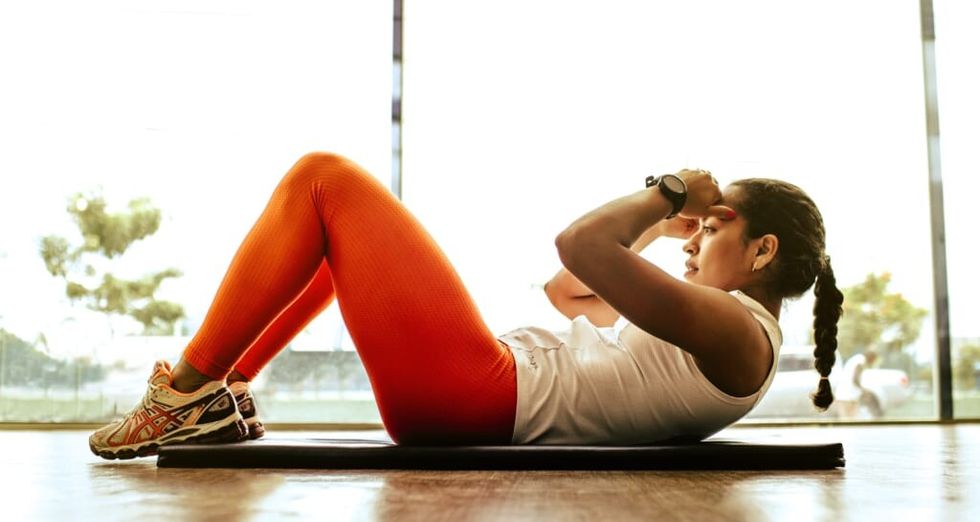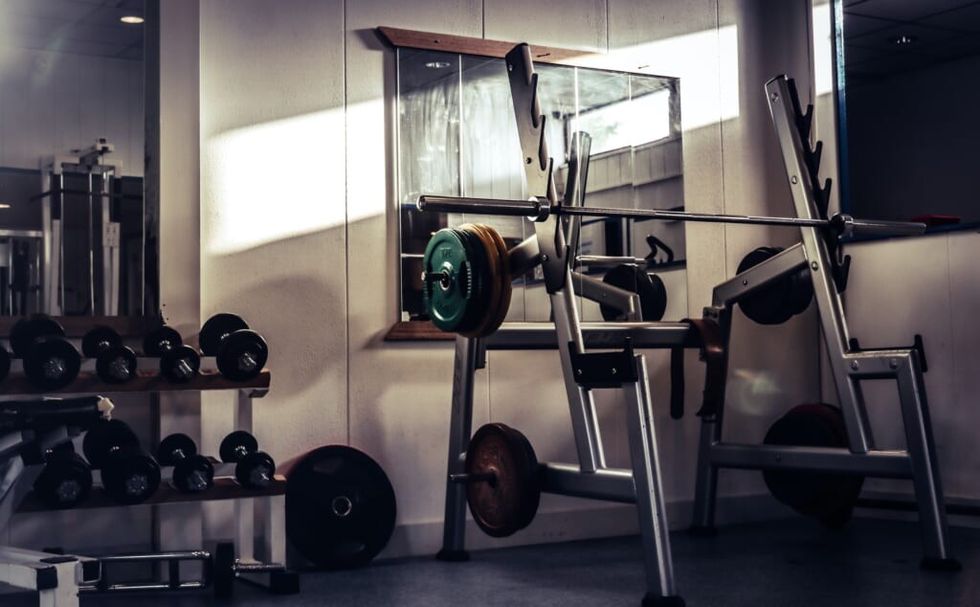With access to a wide range of equipment, and an environment designed to motivate your workouts, gyms can be a sanctuary, a space to focus exclusively on your fitness goals. Common fitness advice — particularly that tailored to strength training or gaining muscle — encourages people to develop the habit of making the gym a regular occurrence. Any resistance is a lack of motivation, of not wanting it enough.
But what about people that don’t lack motivation, but instead, experience anxiety towards the gym? Rather than a motivational sanctuary, the atmosphere of a gym can trigger anxiety and self-consciousness.
RELATED: SMART Fitness Goals Examples to Motivate You
Energy is then wasted on worrying about what other people think, rather than focusing on learning techniques or pushing yourself to reach new physical goals. The gym, for all its promise of success, can become a burden.
It’s a tough spot to be in. If you have a strong desire to find a routine, gym anxiety can lead to feeling like a failure, despite being committed. This article will provide support in overcoming anxiety, so that you can attend the gym burden-free and make the most of what it has to offer. So let’s dive into the world of ‘gymtimidation’ to make your experience more… gymjoyable…
What Is Gym Anxiety?

Gym anxiety is incredibly common, and absolutely not a personal failing. One study of 2,000 Americans found half of them felt daunted by working out in a gym, surrounded by other people. That means when you’re at the gym and feel anxious, you can be fairly confident you’re not alone. Attending the gym can be a practice of self-compassion, and compassion for other people you encounter, a sense of common empathy for people trying their best to work on their fitness and health.
Sport psychologist Jenny Meggs notes that the prime cause of gym anxiety comes from viewing the gym as an unfamiliar or intimidating place. That’s a crucial insight, as it calls for a different approach for beginners and those well-versed in #gymlife. For beginners, common causes of anxiety include uncertainty around workout routines, exercise, using different types of equipment, making mistakes, or being judged by people with more experience.
RELATED: 20 Fitness Motivation Quotes to Break Out of Your Comfort Zone
Gym anxiety is closely linked to social anxiety. One way of identifying the difference is to ask yourself: would I have the same insecurity if the gym was empty? For example, if you’re anxious about learning how to bench press, you might find you feel even more nervous if there was no one around to support you! The anxiety here is useful, because it encourages you to take care, and train with safety in mind.
However, if you’re anxious about being judged, then it’s more to do with the social aspect of the gym, the daunting experience half of Americans experience. That requires a different toolkit in order to approach the problem. Identifying the root of your anxiety gives you a clearer path to finding solutions. And, true to the human experience, often it’s a mixture of overlapping causes; the more confident you get with the equipment, the less you’ll worry, and so on.
Ease Uncertainty With Education

The solution to uncertainty is education. If you’re a beginner, a period of uncertainty is understandable, from how to use the equipment, to what routines are effective, to what exercises to do in what order and for how and how many sets for building muscle or losing fat and how much cardio and… you get the point. Fortunately, we live in an age of information, perhaps even too much information, but guidance is available.
When I started out, I remember the feeling of overwhelm. I joined a rough-and-ready gym near my home, full of alpha males about four times my size, benching more than I weighed. I was facing not only the uncertainty of training but self-consciousness and anxiety. Slowly, I realized that these experiences are related. Believe it or not, most of the hardcore trainers were more than happy to assist.
RELATED: Inspiring Man Loses 50 Pounds In Prison, Continues to Transform His Life Through Fitness
Sure some guidance wasn’t useful. I remember some guy looking at me, dead in the eyes, and saying, “it’s pretty simple, just lift more than you are at the moment because that’s too light.” I remember thinking, “cheers mate, I’m trying!” But the point is, many people have been on a similar path, and are more than happy to guide a newcomer. I’d dismissed this by creating an internal me vs. them mindset, and viewing ‘them’ as unwelcoming. It was a lesson. Assuming someone who looks a certain way to be judgemental is judgment.
Outside of the gym, YouTube and Google are your friends. Start by looking at routines for beginners. Look up tutorials on equipment. Understand the basics of nutrition. Consider your goals. And take it real easy in the early stages. I’ve been training for 13 years and there are still pieces of equipment I can spend minutes staring at, trying to work out what body part they operate. Plus, compound movements, such as squats, deadlifts, and bench presses, require a lot of focus on proper form. It takes time.
Digging Into the Causes of Anxiety

Caring about what other people think is a form of social anxiety. Like it or not, unless you have a personal gym in your garage or mansion, the gym is a social place. If you want to attend, and your goals depend on consistent attending, it’s something that has to be managed. Avoiding the gym due to fear of judgment places the assumed or projected opinion of others (mostly strangers) ahead of your personal goals.
Start by digging into underlying beliefs. When you bring the fear of judgment to the surface, what content is there? You might notice some common beliefs such as:
- People will think I’m silly for not knowing how to use the machines.
- Other people will judge my physique or strength.
- People will ridicule me for doing something wrong.
Remember the fear of what other people think is insecurity projected. It’s amplified by the spotlight effect, where people believe they’re noticed more than they believe they are. It can be a relief to realize that most gym-goers are too focused on their own workout to care about others. When you start paying attention to what others think, re-focus on the workout in front of you. Trust others will do the same.
RELATED: 5 Reasons to Prioritize Physical Fitness In the Mornings
Cognitive reframing helps. For example, challenging the belief and replacing it with something much more compassionate, such as “it’s understandable to be unsure about how to train properly, with the correct technique.” Any issues that arise around body image are their own set of insecurities that need exploring, beyond the scope of this article. Try your best to avoid comparison and self-judgment. Be inspired. But don’t insult yourself in the process; the gym is a skewed sample of the human physique.
Keep in mind that even seasoned pros feel anxiety in the gym. Injury, time-off, and new routines, all set people back to beginner mode, even if temporary. For example, an advanced trainer might have high standards that they feel they aren’t meeting. The muscle man might have muscle dysmorphia. If you play the game of comparison, the bodybuilder who benches 100kg will look at the guy benching 110kg and run the risk of feeling inferior. It’s a futile game, one to be avoided.
Always keep yourself as the barometer. Start at ground zero and look to gradually improve. When I first went to the gym, all those years ago, I stepped up confidently to bench press for the first time, decided to warm up with the bar and… struggled to do a few reps. No one had told me the bar alone weight 25 kg, and that was enough for me! But those first few times I put plates on, even a few kilos? Although my ego wanted to judge, the greater part of me was happy with the accomplishment.
Sometimes the Gym Is the Problem

Not all gyms are equal. Sometimes the environment is the problem. Maybe it’s incredibly busy, and you have to regularly wait for equipment, or feel like someone is always waiting whilst you’re trying to focus on your own routine. Maybe it’s more of a social space for regulars, who spend the majority of their time talking. Consider the percentage of the issue that comes from your mindset, and what comes from the environment. From there, take practical steps.
If you’re self-conscious, you might feel the gym is busy, even though you are able to access all the equipment you need, when you need it. I’ve fallen into this trap. My current gym gets progressively busier from 9 am onwards, so I go before. On days when I’m running behind, I feel anxiety, fearing if I’m late, it’ll be too busy and my flow will be interrupted. Yet, on those days, I’m still able to do everything I need.
RELATED: At 70, This Woman Defied All Odds By Starting Her Fitness Journey
If you feel the environment isn’t supportive, consider if you’re looking for too much extrinsic motivation. It’s easy to blame outer circumstances for why you’re struggling for motivation or not pushing yourself, but can you evoke that feeling from within? Can you be intrinsically motivated by your goals and values? That might mean playing music that motivates you, keeping your long-term goals in mind with each rep, or going with a friend for mutual support.
If all else fails, consider changing gym. Maybe you’ll find one closer to home, one with more equipment, a different gender balance, one that is quieter, or is full of people focusing on certain routines (such as powerlifting or Crossfit) where the environment itself is motivating and teaching.
In Conclusion

You want to feel supported by your environment when aiming for fitness goals, that’s why most people join a gym in the first place. Gym anxiety can be a huge barrier to that. Depending on how extreme it is, it’s not going to be an overnight fix. Accepting anxiety will be part of the process. But as you familiarize yourself with the environment and start progressing, the gym becomes a training ground for transcending both physical and mental limitations.
KEEP READING:
6 Apps to Improve Your Physical Fitness in a Few Minutes a Days
Credit: Source link



